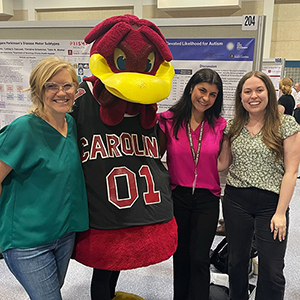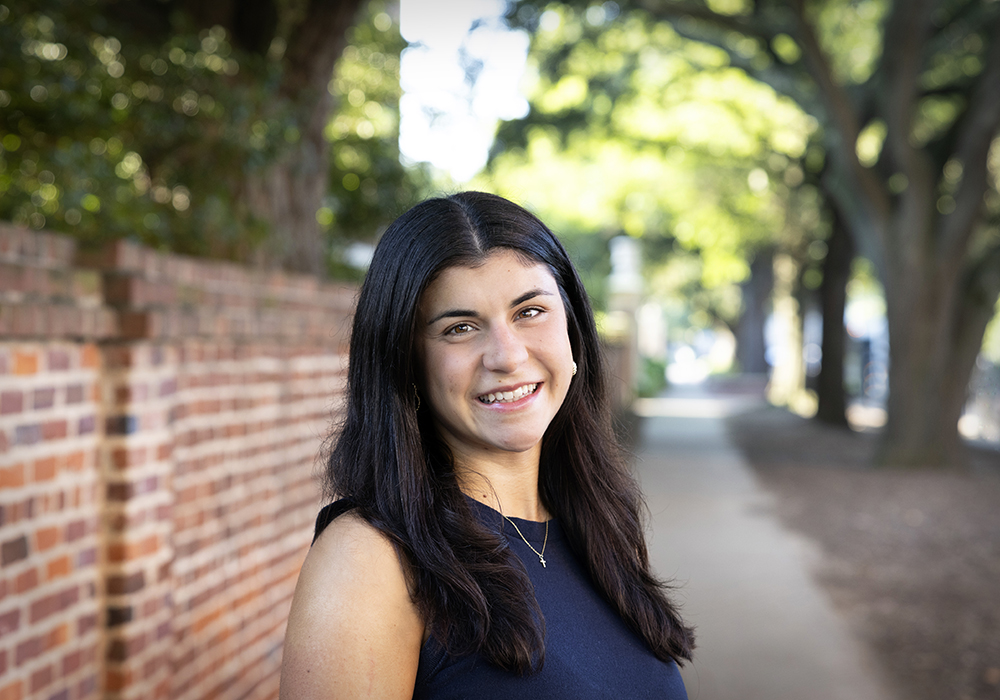If Jaelyn Souza could give just one piece of advice to this year’s incoming students at the University of South Carolina, it would be this: “Keep an open mind, because me as a freshman and me as a senior are two very different people.”
Souza will graduate with her degree in neuroscience this December, but she still remembers what it was like to step on campus for the first time.
“I went to Admitted Students Days, and I fell in love with campus,” she says. “I liked the culture of USC and how big it is, but you still get that small town feeling on campus.”
That first experience helped Souza make up her mind to attend USC and move from her hometown of Rehoboth, Massachusetts. She was a pre-health student, so she signed up for the neuroscience major in the McCausland College of Arts and Sciences and charted out the courses she needed to take the Medical College Admissions Test.
As a freshman, she joined Galen Health Fellows and lived within a community of other health sciences students. She took on a leadership role and joined USC’s chapter of Alpha Epsilon Delta, the national pre-health honor society. For the first two years of college, Souza was all-in on her pre-medical school track. But then she changed her mind. Her advice to other students: “That’s OK.”
“I think people are sometimes afraid to give up that dream and say, ‘You know, this actually isn’t what I want to do,’” she says. “If you want to be a doctor, that’s amazing. We need more doctors! But I realized there are so many other options to help people in this world. You don’t have to have M.D. after your name to do so."
“It’s been incredible. I’ve had some amazing opportunities to expand my personal growth. There are so many resources available, from the network USC provides through faculty to the community organizations connected to the university.”
Souza gave her decision a lot of consideration, basing it on her experiences in real-world clinical settings. As a freshman, she got her Certified Nursing Assistant license and started working as a patient sitter at Lexington Medical Center. During her eight-hour shifts, she spent time with individual patients, helping with activities of daily life and connecting with them over long conversations and card games.
Since she hoped to work with children, Souza also spent time volunteering at Prisma Health Richland Hospital in the neonatal intensive care unit. The summer after her freshman year, she shadowed a pediatrician in her hometown in Massachusetts.
In all these experiences, Souza says the doctors she encountered had to keep up an incredibly quick pace.
“I started to notice how little the doctors got to interact with the families. The doctors in the NICU came around maybe once every few hours. And with the pediatrician, as much as I saw that she was able to care for her patients and really enjoyed her job, I much more enjoyed having those in-depth moments with my patients as a patient sitter,” Souza says.
While some areas of health care do allow for physicians to spend more one-on-one time with their patients, Souza says it wouldn’t be the case in the fields she knew she wanted to pursue. Through her experience at USC, she realized that her biggest passion is working with kids – especially at-risk children, like those she has worked with in her research.

In her second semester, Souza connected with associate professor Jessica Bradshaw, who leads USC’s Early Social Development Lab. She started working as a video coder for one of Bradshaw’s studies on early signs of autism in children who have autistic siblings. Her job was to review footage of the children playing to note any subtle differences in how the children paid attention to toys while playing alone.
The study inspired her to take on an independent study with Bradshaw during her junior year, with an original project building on her work in the lab. Souza presented her findings at Discover USC in 2024 and won first place honors.
Souza now aims to go into special education. For her major, she has a concentration in neurodevelopment, which will further prepare her to pursue her Master of Arts in Teaching in Special Education after graduation.
“I want to work with autistic children and young people with other disabilities. My primary goal further down the line would be to serve in school systems with at-risk youth,” she says.
“Ideally, I would love to get a job in a high school, because I would be with the same students daily. I see myself having those long conversations with students. We can establish rapport with one another, and I wouldn’t be a stranger to them.”
To prepare for her new career path, Souza has shadowed teachers in a special education classroom through the career center’s SpursUp Shadow Program. In the summer, she volunteered at a horse farm that provides animal therapy to children with autism and other disabilities. This semester, she’s working in an after-school program to gain even more experience in her field.
Looking back, Souza says it was all of her beyond the classroom experiences at USC that ultimately helped her decide what she wanted for her future.
“It’s been incredible. I’ve had some amazing opportunities to expand my personal growth. There are so many resources available, from the network USC provides through faculty to the community organizations connected to the university.”
Her final piece of advice for other students at USC:
“Get involved with as much as you can when you can, so you can pinpoint what you like and dislike,” she says. “Because it’s one thing to learn about something the classroom, and it’s another to actually go ahead and do it.”
